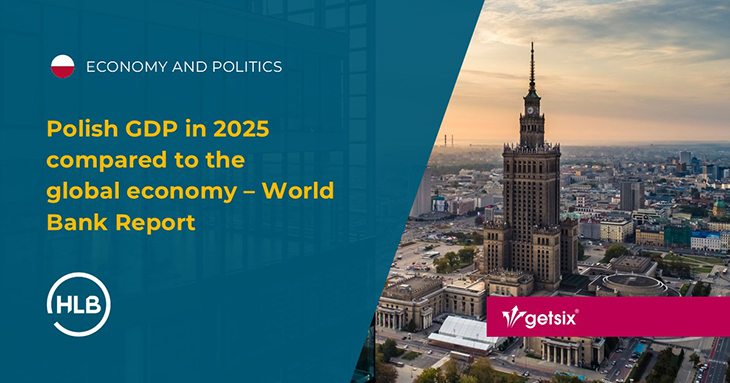Polish GDP in 2025 compared to the global economy – World Bank Report
Forecasts in the World Bank’s Global Economic Prospects report indicate that the Polish economy is expected to grow by 3.4% in 2025. Although this growth rate has been revised downward compared to previous forecasts (3.7%), Poland remains one of the fastest-growing economies in Europe, well ahead of the eurozone, where growth is expected to be only 1.0% in 2025. The forecast for global growth of 2.7% also stands out in this context. Forecasts predict further growth of the Polish economy in 2026, although at a slightly slower rate of 3.2%. This will still be one of the higher growth rates in Europe, with global growth remaining at 2.7%.
Poland’s position in Europe and the world
The largest economies in the European Union, such as Germany, France, and Italy, are expected to record lower economic growth rates. Forecasts for Germany predict a growth of 0.3% in 2025 and 1.1% in 2026. For France, the respective rates are 0.8% and 1.1%, while Italy is projected to grow by 0.7% in 2025 and 0.9% in 2026. Maintaining a high growth rate almost twice as high as in developed economies proves the solid macroeconomic foundations and effective fiscal and monetary policy.
Experts emphasize that EU funds, amounting to approximately PLN 120 billion, and investments in innovation and high-tech industries, could play a key role in sustaining this pace. Increasing the share of the high-tech sector in Poland’s GDP can attract additional foreign capital and increase productivity.
Challenges for the Polish economy
Despite optimistic forecasts, Poland faces challenges that could impact its economy. The World Bank notes that declining foreign direct investment (FDI), currently at half the level of the early 2000s, may limit modernization and competitiveness. Additionally, global political and trade uncertainties, as well as persistent inflation, could undermine investor confidence.
Global perspectives
The World Bank predicts that the global economy will grow at a rate of 2.7% per year in 2025 and 2026. Developing economies, including Poland, are playing an increasingly important role in global growth, currently accounting for 60% of its dynamics. Their share of global GDP has risen from 25% in 2000 to 45% today. However, growth in these countries, at around 4%, remains slower than before the pandemic, limiting their ability to reduce poverty and achieve development goals.
Optimism of experts
Polish economic experts suggest that the World Bank’s forecasts may be overly cautious. They emphasize that the aforementioned capital inflow, including EU funds worth approximately PLN 120 billion, along with improving consumer attitudes, could contribute to higher economic growth in Poland than currently forecast. The dynamic development of investments and regional cooperation within the European Union could also positively impact Poland’s future growth prospects.
Summary
Poland’s economy in 2025 has the potential to stand out from both the region and developed economies. The key to further development will be investing in innovation, strengthening its position in Europe, and effectively utilizing available EU funds. At the same time, it will be essential to monitor global risks such as trade tensions and persistent inflation, which could affect growth dynamics. Thanks to its solid foundations and growth prospects, Poland remains an attractive destination for investors and entrepreneurs seeking new opportunities.
The full report in English can be found here.
If you have any questions regarding this topic or if you are in need for any additional information – please do not hesitate to contact us:
CUSTOMER RELATIONSHIPS DEPARTMENT

ELŻBIETA NARON
Head of Customer Relationships
Department / Senior Manager
getsix® Group
***





